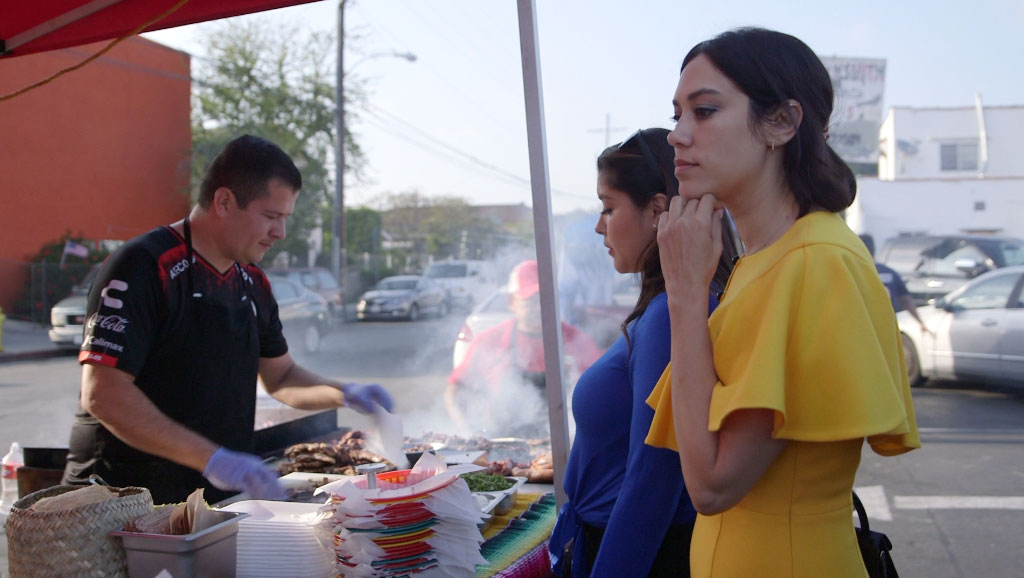[dropcap size=big]S[/dropcap]tarz has renewed its hit Latinx-centered series, Vida, for a third season. The news came just days after Vida’s Season 2 premiere on May 23, which picks up the story of two Latina sisters struggling to keep their mother’s old Boyle Heights bar open after her untimely death.
The show made headlines in its debut season as the first television series to feature an “all-Latinx” writers room. As a show written ‘by and for’ a Latinx audience, Vida’s signature themes include generational family secrets, ruthless gentrification versus earnest ‘gentefication,’ LGBT and queer representation, and sex.
Lots of great, graphic sex.

From NBC’s Cristela (2015) and Fox’s Bordertown (2016) to Netflix’s One Day at a Time (2017) and CW’s Jane the Virgin (2014), so many beloved Latin-centered television shows have been cancelled in recent years. But there’s life. We can count Vida among a crop of new shows that feature Latin actors and stories, such as Netflix’s Mr. Iglesias and the new Party of Five reboot. For these shows to last, however, audiences must tune in—and not just “Latinx” folks. Vida fans already know to support the series, but why should new audiences tune in to a show about a queer Mexican American family fighting each other and the gentrifying forces in their millennial East L.A. neighborhood?
Vida co-stars Chelsea Rendon and Mishel Prada spoke to L.A. Taco just hours after the news dropped that Starz would renew the show for a third season. The mood felt especially celebratory at Tacos Don Cuco, where we feasted on delicious tacos de adobada at the popular Tijuana-style taquero.
Rendon brought us here because “these are the best tacos in L.A.,” according to the Montebello High School graduate. She plays Mari “La Pinche Chinche,” the community activist who battles with her father and brother’s machismo at home while fighting the Hernández sisters’ “gentefication” out in the community.
“And we’re celebrating Season Three. I’m so excited. It’s been amazing,” Rendon said.
Prada agreed. “We really didn’t know if we were going to get [a third season], and seeing people show up to support the show was so beautiful. It’s not just for us,” she said, referring to Vida’s cast and production team. “It feels like we all did it together, and that’s the way it should be. We should be coming together and honoring work that is promoting our stories.”
Prada plays the corporate-minded power-lawyer Emma, one of two Hernández sisters who, along with their mother Vidalia’s butch wife Eddy (played by the Huntington Park-born nonbinary Latinx actor Ser Anzoategui), must decide how to manage the bar that Vidalia bequeathed to all three of them.
RELATED: ‘Dolores’ Film Seeks to Re-Think Labor Leader Dolores Huerta — Again
[dropcap size=big]I[/dropcap]n Season 2, we see an unlikely sisterly relationship develop between Emma and Mari. Johnny and Lyn, Emma’s sister, return as on-gain, off-again high-school sweetheart lovers. And Eddy, recovering from homophobic beating at the bar, remains on the outs when Emma discovers that she and Vidalia were never legally married.
For Latinx audiences, Vida’s compelling story lines and cultural representations speak directly to these communities without having to translate. “It’s a lot of little things,” Prada said. “Like there’s no Tupperware [in the fridge], there’s mantequilla, sour cream, and beans in there that someone who grew up in Malibu might not recognize, but you do recognize it, and it doesn’t have to be explained.”
Rendon points to the importance of collective success and community efforts in order for shows like Vida to stay in production. “I would like to think that Vida’s success has something to do with the [new shows],” she said. “There’s the Party of Five reboot and Mr. Iglesias. There’s context now, and an audience. One Day at a Time helped us. It’s each show helping the other succeed. It’s not competition with us.”
Despite these positive gains in Latino/a/x-centered programming, Rendon acknowledges the inevitable fact. “At the end of the day, this is a business. And the viewers, subscriptions, the money has to be there.”
So why is it important for new audiences to tune into Vida? What’s in it for a non-Latinx viewer? Rendon describes the show’s willingness to broach difficult subjects with honesty and openness. “With the queerness, with the body positivity, with Emma’s character not defining herself or her sexuality—those are things that need to be talked about, especially in the Latino community,” Rendon said.
“But even though these are Latinos, we can pick up these stories and communities and put them anywhere in the world because of the universal themes,” she continuds. “Gentrification is happening everywhere.” Rendon cites family, relationship, and community “drama” as other important universal aspects of Vida.
And of course, there’s food. The tacos, birria, flans. Prada’s character Emma eats a lot on the show, and she’s the only character associated with a food item—Valentina hot sauce.
“I love to eat, so that’s one influence on Emma,” Prada said. The Miami-born actor, who credits L.A. Taco with helping her find the best food in town when she first moved here, regards food as an ideal gateway into a culture.
“And it’s an easy way for Emma to hold on to her past, and her childhood, especially when she’s back in that neighborhood eating that taco, the orejitas, that flan in Season One," she added. "You see Emma falling right back into her food habits. It’s a big part of our Latin culture. And it’s a beautiful thing.”
RELATED: 'Look at Us Now' ~ Cypress Hill Becomes the First Latino Hip Hop Group on Walk of Fame







